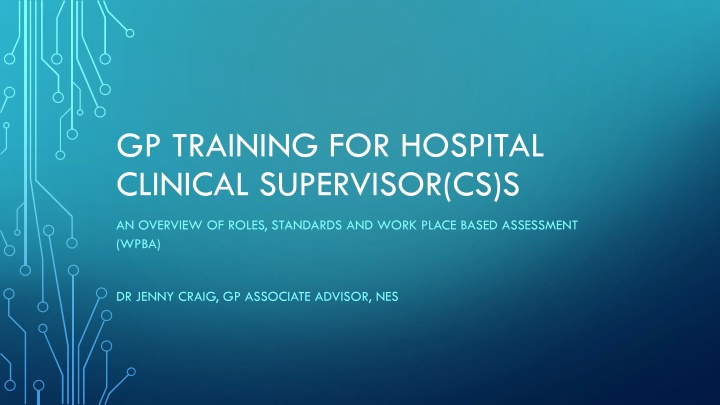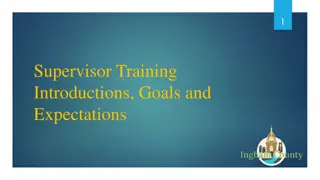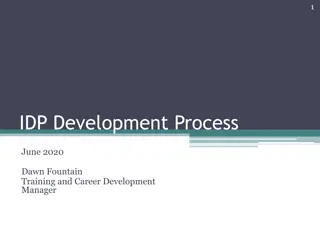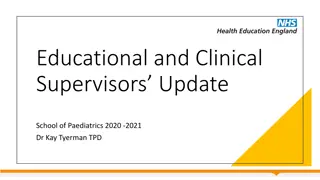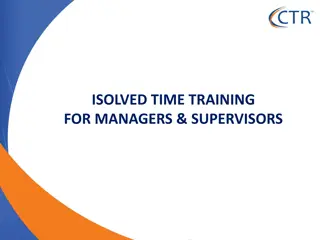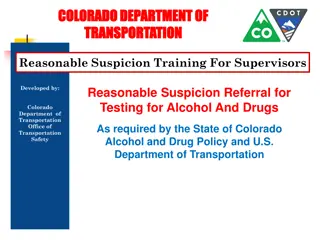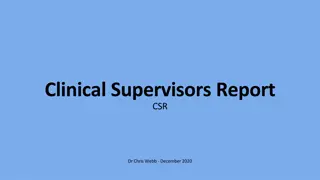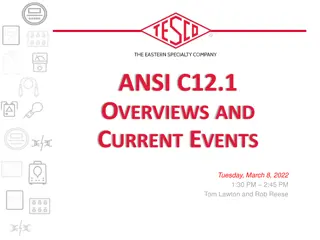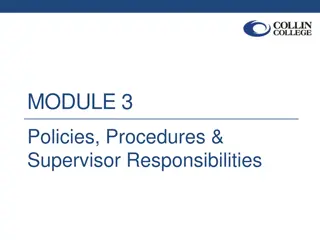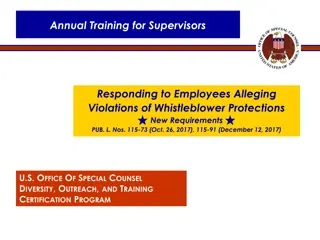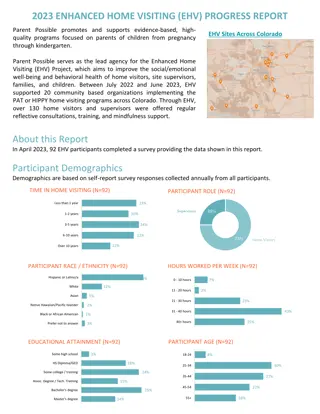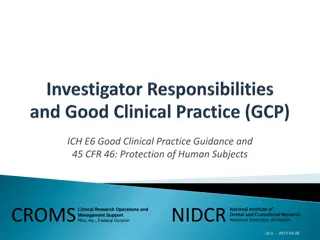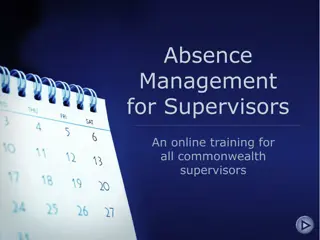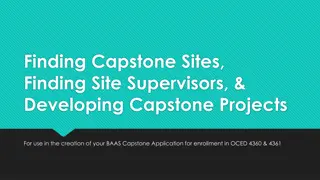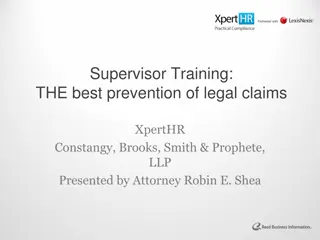Overview of Roles and Standards for Clinical Supervisors in GP Training
Get an in-depth understanding of the roles and responsibilities of Clinical Supervisors (CS) and Educational Supervisors in General Practice Specialty Training (GPST). Explore workplace-based assessments (WPBA) and tools, as well as indicators of potential underperformance. Learn about the GP Curriculum, WPBA requirements in non-primary care posts, and different types of WPBA. Discover the responsibilities of CS, including conducting Placement Planning Meetings, completing assessments, and advising on trainee issues.
Uploaded on Aug 10, 2024 | 2 Views
Download Presentation

Please find below an Image/Link to download the presentation.
The content on the website is provided AS IS for your information and personal use only. It may not be sold, licensed, or shared on other websites without obtaining consent from the author.If you encounter any issues during the download, it is possible that the publisher has removed the file from their server.
You are allowed to download the files provided on this website for personal or commercial use, subject to the condition that they are used lawfully. All files are the property of their respective owners.
The content on the website is provided AS IS for your information and personal use only. It may not be sold, licensed, or shared on other websites without obtaining consent from the author.
E N D
Presentation Transcript
GP TRAINING FOR HOSPITAL CLINICAL SUPERVISOR(CS)S AN OVERVIEW OF ROLES, STANDARDS AND WORK PLACE BASED ASSESSMENT (WPBA) DR JENNY CRAIG, GP ASSOCIATE ADVISOR, NES
OBJECTIVES Define the roles and responsibilities of the Clinical Supervisor and Educational Supervisor in General Practice Specialty Training (GPST) Familiarise CSs with GPST Work Place Based Assessment (WPBA), WPBA tools in non primary care posts and WPBA professional capabilities Introduce the Indicators of Potential Underperformance (IPUs) Describe the GP Curriculum and how it links to WPBA Define who can complete WPBA in non primary care posts Calibrate the standards required in GPST WPBAs Outline GPST WPBA requirements whilst in non primary care posts Provide a basic understanding of each GPST WPBA type
CLINICAL SUPERVISOR ROLE Usually a consultant to whom GPST1/2 is attached throughout non primary care post Has direct log in access to the trainee eportfolio (fourteen fish) or can access via a ticket code sent by trainee Must have attended appropriate CS training (FDA courses in Scotland)
EDUCATIONAL SUPERVISOR ROLE Always a GP Has undertaken formal training in GP education Provides educational support throughout GPST programme Reviews educational progress every 6 months at interim reviews and annual ESRs (often reliant on CSR for evidence of progress) First point of contact for any trainee issues progression, illness, etc.
CLINICAL SUPERVISOR RESPONSIBILITIES Act as named supervisor for duration of non primary care post (usually a consultant) Conduct placement planning meeting (PPM) at start of post Complete at least 1 WPBA ideally 1 Case Based Discussion (CBD) and 1 Mini Clinical Evaluation Exercise (miniCEX) Complete Clinical Supervisor Report (CSR) at end of post Advise ES/GP TPD of any sickness absence, adjustment to working hours, referrals to OHS
PLACEMENT PLANNING MEETING (PPM) Review learning needs and agree educational plan use condensed curriculum guides if there is one that is relevant to the specialty (see next slide) Remind trainee to complete mandatory PPM learning log entry as the record of the placement planning meeting Set date for mid point review and final review to complete CSR
CONDENSED CURRICULUM GUIDES Developed by NES as guides to the RCGP Curriculum (PDF files) Including roles, assessments and CBD guide for Clinical Supervisors and trainees whilst in specific hospital attachments O&G, Paediatrics, Communicable Disease, Psychiatry, ENT, Ophthalmology, A&E, Medicine, Medicine of the Elderly, End of Life Care, Orthopaedics & Trauma
CONDENSED CURRICULUM GUIDES https://www.scotlanddeanery.nhs.scot/trainee-information/gp-specialty- training/gp-trainees-in-hospital/
GPST WPBA Linked to 13 professional capability areas Includes formalised assessments and learning log evidence collected in fourteen fish eportfolio Comprises one third of MRCGP examination, complementing the other exam components Applied Knowledge Test (AKT) & Clinical Skills Assessment (CSA) [Temporarily replaced by Recorded Consultation Assessment (RCA) under covid] Provides a framework for evaluating areas of GPSTs progress best assessed in the workplace Reviewed every 6 months to make a judgement about progression to next stage of training and, at the end of training, about readiness for independent practice
WPBA TOOLS IN NON PRIMARY CARE POSTS Case Based Discussion (CBD) Mini Clinical Evaluation Exercise (MiniCEX) Multi-Source Feedback (MSF) Clinical Examination & Procedural Skills (CEPS) Clinical Supervisors Report (CSR) Learning Logs including Clinical Case Reviews recorded by the GPST on eportfolio Personal Development Plan (PDP) recorded by the GPST on the eportfolio
WPBA PROFESSIONAL CAPABILITIES AND INDICATORS OF POTENTIAL UNDERPERFORMANCE Derived from core RCGP curriculum statement Being a GP Framework made up of 13 capabilities Aim at end of training is to reach competence in all 13 capabilities Competence means having abilities, knowledge and skills for independent professional practice Series of word descriptors describing positive behaviours doctors display in practice IPUs are word descriptors of negative behaviours which underperforming doctors may demonstrate
WPBA PROFESSIONAL CAPABILITIES Fitness to Practice Maintaining an Ethical Approach Communication & Consultation Skills Data Gathering & Interpretation Clinical Examination & Procedural Skills Making a Diagnosis/Decisions Clinical Management Managing Medical Complexity Working with Colleagues & in Teams Maintaining Performance, Learning & Teaching Organisation, Management & Leadership Practising Holistically, Promoting Health & Safeguarding Community Orientation
WPBA PROFESSIONAL CAPABILITIES https://www.rcgp.org.uk/training-exams/training/mrcgp-workplace-based- assessment-wpba/wpba-capability-framework.aspx
INDICATORS OF POTENTIAL UNDERPERFORMANCE (IPUS) https://www.rcgp.org.uk/-/media/Files/GP-training-and- exams/WPBA/WPBA-capabilities-with-IPUs-detailed-descriptors.ashx?la=en
GP CURRICULUM Core Curriculum entitled Being a General Practitioner Broken down into topic guides relating to professional issues, life stages and clinical areas For WPBA topic guides grouped into shorter list of Clinical Experience Groups These are linked to assessments CS completes with GPST
CLINICAL EXPERIENCE GROUPS Infants, children and young people (under the age of 16) Gender, reproductive and sexual health (including women s & men s health, LGBTQ, gynaecology & breast) People with long term conditions (including cancer, multimorbidity & disability) Older adults (including frailty and end of life) Mental health (including addiction, alcohol and substance misuse) Urgent and unscheduled care People with health disadvantages and vulnerabilities (including veterans, mental capacity, safe-guarding and those with communication difficulties/disability) Population health and health promotion Clinical problems not linked to a specific clinical experience group
WHO CAN COMPLETE WBPA IN NON PRIMARY CARE POSTS? CSR should be completed by named CS (who needs to have met GMC Educator requirements) At least 1 assessment (ideally 1 CBD AND 1 MiniCEX) should be completed by CS before CSR allows CS to have evidence of trainees performance Other assessments completed by doctor at ST4 or above or SAS equivalent Assessments should NOT be completed by peer or trainee of the same level or below May be some exceptions (e.g. specialist nurse for CEPS assessment)
CALIBRATING STANDARDS REQUIRED IN GPST WPBA GPSTS rated in comparison to other trainees at same stage of training or comparable specialty trainees ONLY exception is assessment of competence in CEPS when standard is that of independent practitioner carrying out examination or procedure Assessors asked to define level of complexity of case low, medium, high and link to relevant Clinical Experience Groups
CALIBRATING STANDARDS REQUIRED IN GPST WPBA Grade for assessments and descriptors for assessment of performance level described on following slides Additionally , in CSR, CS asked entrustable question relating to level of supervision required during the post Word pictures for grades within each capability should be used alongside assessments until assessor familiar with content
ASSESSMENT OF PERFORMANCE LEVEL (CBD & MINI-CEX) Based on observation please rate trainees overall performance Below the level expected prior to starting on a GP training programme Below the level expected of a GP trainee working in current clinical post At the level expected of a GP trainee working in the current clinical post Above the level expected of a GP trainees working in the current clinical post MiniCEX also includes non-applicable option
ASSESSMENT OF PERFORMANCE LEVEL (CEPS) Based on this observation please rate this trainees overall performance Unable to perform the procedure appropriately Able to perform the procedure but needs direct supervision and/or assistance Able to perform the procedure with minimal supervision or assistance Competent to perform the procedure unsupervised
CSR LEVELS OF SUPERVISION IN NON PRIMARY CARE POSTS Level Supervision definition 1 Cannot be left without direct supervision Limited to observing care and/or Seeing patients alone but not allowed to let patients leave the building or complete an episode of care before review by the supervisor 2 Requires more supervision than expected in their clinical role Requires direct supervision by named supervisor Trainee may provide clinical care but the supervisor (or in their absence a delegated supervisor) is physically within the building and is immediately available if required to provide direct supervision on specific cases and non immediate review of all cases *If levels 1 or 2 are selected the CS will be required to clarify their reasons for this choice and it is expected they would contact the local GP TPD/ES to inform them of their concerns
CSR LEVELS OF SUPERVISION IN NON PRIMARY CARE POSTS Level Supervision definition 3 Requires expected levels of supervision in their clinical role Requires indirect supervision by the named supervisor The trainee may provide clinical care when the supervisor is at a distance (urgent/unscheduled care, home visits) but is available by means od telephone to provide advice, and available to attend jointly if required to provide direct supervision The trainee does not ned to have every case reviewed but a regular review of random or selected cases takes place at routine intervals 4 Requires no supervision in their clinical role It is proposed that GP trainees will only reach level 4 at the end of their training
GPST MINIMUM WPBA REQUIREMENTS NON PRIMARY CARE POSTS ST1 ST2 Old* After Aug 2020 Old* After Aug 2020 MiniCEX 6 (3 per post) 4 (2 per post) 6 (3 per post) 4 (2 per post) CBD 6 (3 per post) 4 (2 per post) 6 (3 per post) 4 (2 per post) MSF 0 1 cycle - 10 respondents 0 1 cycle 10 respondents CEPS Across all years of training need to compete 5 mandatory CEPS and range of others PPM Suggested 1 per post Suggested 1 per post CSR 1 per post 1 per post 1 per post 1 per post Learning logs Trainee s responsibility to complete 3 clinical case reviews per month (FTE) Significant Event Trainee s responsibility to document if reaches GMC threshold of potential/actual serious harm Learning Event 1 required per year of training trainee s responsibilty to document ESR Trainee s responsibility to arrange and meet ES every 6 months reliant on good quality CSR
COMPLETING WPBA CASE BASED DISCUSSION (CBD) Carried out by Clinical Supervisor (best practice) or ST4 or above, or SAS who have met GMC assessor requirements Trainees chose who undertakes their CBDs Trainees encouraged to complete CBDs with a breadth of assessors consultants and seniors trainees At least one CBD completed by named CS during each post
COMPLETING WPBA CASE BASED DISCUSSION (CBD) Structured interview between educator and trainee Focus on what actually happened rather than asking what if Cases should have been directly managed by trainee rather than cases they have observed
COMPLETING WPBA CBD BEFORE YOU START Needs protected time Trainee responsible for selecting case, organising for assessment with identified, approved assessor and completing preparatory work For each CBD trainee should select case and share details of clinical entry and medical summary at least 3 days before discussion Trainee needs to prepare case against capabilities they believe case covered usually 3 or 4 capabilities Helpful for assessor to be familiar with case before the discussion
COMPLETING WPBA CBD BEFORE YOU START Important for trainee development that discussion is used to guide further development be offering structured feedback CBD should take 30 minutes 20 minutes for discussion and 10 for structured feedback For help with question development for each capability there is a CBD Question maker available https://www.rcgp.org.uk/-/media/Files/GP-training-and-exams/Information-for- deaneries-trainers-supervisors/The-RCGP-Guidance-for-Clinical-Supervisors-on- Completing-Assessments.ashx?la=en Pages 16 - 22
COMPLETING WPBA CBD - THE PROCESS There is detailed guidance on the process of completing a CBD available https://www.rcgp.org.uk/-/media/Files/GP-training-and-exams/Information- for-deaneries-trainers-supervisors/The-RCGP-Guidance-for-Clinical- Supervisors-on-Completing-Assessments.ashx?la=en Pages 10 & 11
COMPLETING WPBA CBD GIVING FEEDBACK Record judgement of level of performance demonstrated by trainee for each capability, along with recommendation for development specific and descriptive Record in eportfolio using ticket code or CS eportfolio access best done jointly so what is documented is shared and owned BUT assessor ultimately responsible Trainees are rated in comparison to other trainees at the same stage of training Detailed and high quality written feedback is vital in assessing trainees progress through training
COMPLETING WPBA MINI CLINICAL EVALUATION EXERCISE (MINI CEX) Used to assess clinical skills, attitudes and behaviours in non primary care setting 15 minute snap shot of how trainee interacts with patient Each miniCEX should represent a different clinical problem Vary types of cases assessed to assess trainees competence on different challenges At least One miniCEX should be completed by CS, others can be completed by doctor at level ST4 or above or SAS equivalent
COMPLETING WPBA MINI CLINICAL EVALUATION EXERCISE (MINI CEX) Assessor should give trainee immediate feedback Provide contemporaneous report, rating trainee and caputuring feedback in eportfolio - using ticket code or CS eportfolio access Trainees are rated in comparison to other trainees at the same stage of training Detailed and high quality written feedback is vital in assessing trainees progress through training
COMPLETING WPBA CLINICAL EXAMINATION & PROCEDURAL SKILLS (CEPS) Development and assessment of CEPS extremely important part of GPST Competence in CEPS is integral to good clinical practice Replaces Direct Observation of Procedural Skills (DOPS), currently used in hospital specialties Evidence of clinical skills gathered through several different assessments and reflective clinical case reviews and log entries
COMPLETING WPBA CLINICAL EXAMINATION & PROCEDURAL SKILLS (CEPS) GMC require trainees to demonstrate competence in 5 mandatory intimate examinations breast, rectal, prostate, female genital (bimanual & speculum) and male genital Suitable trained professional must observe trainee performing examination and record on CEPS evidence form on eportfolio (usually by ticket code ) Assessor must be doctor at level ST4 or above or SAS equivalent If assessor is another health professional e.g. specialist nurse, they must confirm their role and skills to ensure trainee s ES can be satisfied they are appropriately trained in the assessment
COMPLETING WPBA CLINICAL EXAMINATION & PROCEDURAL SKILLS (CEPS) Completing the 5 mandatory CEPS if not enough, trainees need evidence of a wide range of GP relevant CEPS Range of examinations, procedures and number of observations will depend on individual trainee s needs and judgement of CS and ES If trainee performing below expected level CS needs to be specific about why they have concluded this and what trainee should take to improve Trainees are assessed against standard of a fully qualified GP Includes technical aspects of examination, ability to recognise abnormal physical signs and ability to choose examination best suited to clinical context
COMPLETING WPBA MULTI SOURCE FEEDBACK (MSF) Trainee must complete one cycle of MSF during each of S1 and ST2 years Responses required from at least 10 clinicians who know the trainee s work well Should come from range of roles and seniority Trainee s ES reviews responses and releases information to trainee to be used as evidence for 6 monthly reviews
COMPLETING WPBA CLINICAL SUPERVISORS REPORT Short structured report completed by CS towards end of trainees placement Opportunity for CS to give feedback on performance Well completed CSR provides valuable source of evidence for capabilities in ESR and Annual Review of Competence Progression (ARCP) panels CSR links to relevant GP capabilities and includes overall assessment by CS of level of supervision trainee has required
COMPLETING WPBA CLINICAL SUPERVISORS REPORT Responsibility for completion of written report lies with named CS Usual for the CS to gather evidence and discuss the CSR with colleagues In addition to gathering information from colleagues, CS expected to have carried out at least one WPBA (CBD/MiniCEX) personally prior to CSR
COMPLETING WPBA CLINICAL SUPERVISORS REPORT Each of seven questions covers a particular area of practice, e.g. professionalism, followed by description of how this would be observed in clinical practice Each question automatically linked to specific RCGP capabilities (e.g. maintaining performance, learning and teaching, ethics, fitness to practice) Word descriptors developed to support grading and feedback for each question (see next slide) Final question about whether trainee has been involved with any conduct, capability of Significant events and what the outcome has been
COMPLETING WPBA CLINICAL SUPERVISORS REPORT WORD DESCRIPTORS https://www.rcgp.org.uk/-/media/Files/GP-training-and-exams/Information- for-deaneries-trainers-supervisors/The-RCGP-Guidance-for-Clinical- Supervisors-on-Completing-Assessments.ashx?la=en Pages 23-33
RCGP EPORTFOLIO New eportfolio supported by fourteen fish For any eportfolio queries please contact the helpdesk https://support.fourteenfish.com/hc/en-gb https://www.rcgp.org.uk/training-exams/training/mrcgp-trainee- eportfolio.aspx
SUMMARY Vital to know which GPSTs you are responsible for and to have access to their eportfolio Condensed curriculum guides can help guide trainee s learning needs RCGP has specific guidance for CSs on conducting WPBA and WPBA requirements DETAILED AND HIGH QUALITY WRITTEN FEEDBACK IS ESSENTIAL TO ASSESS TRAINEE PROGRESS Communicate early any concerns about a trainee s progress with their ES and TPD
